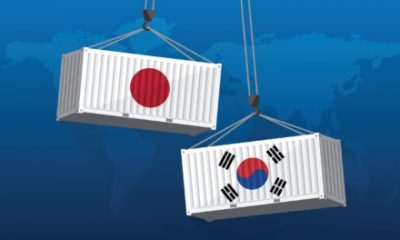A Joint-Russia-China Air Patrol Just Made South Korean-Japanese Tensions Worse

The first-ever long-range joint air patrol between the Russian and Chinese Air Forces got off to a scandalous start after South Korea reportedly fired hundreds of warning shots to ward off what it says was Moscow’s violation of its sovereign airspace near the disputed Liancourt Rocks that it administers, which in turn prompted Tokyo to scold Seoul for responding since it said that only Japanese forces have the right to do so over the territory that their government also claims, thus worsening the already-tense relations between these two American military allies.
***
The first-ever long-range joint air patrol between the Russian and Chinese Air Forces was supposed to be a moment of celebration for both multipolar Great Powers, but it got off to a scandalous start after South Korea reportedly fired hundreds of warning shots to ward off what it says was Moscow’s violation of its sovereign airspace near the disputed Liancourt Rocks that it administers. Russia refuted the accusations and retorted that no such violation occurred, but slammed South Korea’s escort of its aircraft over neutral waters as amounting to “aerial hooliganism“. Japan, however, jumped into the unexpected diplomatic fray by scolding South Korea for responding to what it claims was a violation of its own airspace seeing as how Tokyo also lays claim to the area, which suddenly worsened these two American allies’ already-tense relations that have been damaged by the island nation’s recent decision to restrict the export of special chemicals to the peninsular country.
The South Korean-Japanese trade dispute was caused by Tokyo’s concerns that some of its partners’ companies are illegally transferring these chemicals to North Korea to aid in its chemical weapons program due to their dual use in that industry as well as the semi-conductor one that they’re officially supposed to be used for. Seoul, however, was skeptical from the get-go since it seemed to its policymakers that Tokyo is doing this in response to their court’s decision that their former colonizer pay reparations for its abuse of forced laborers during World War II, with it being thought that Japan is politicizing this trade dispute in order to compel South Korea into concessions on this super-emotive issue under pain of having its economy contract due to its inability to import the chemicals that are indispensable for use in an industry that accounts for roughly a quarter of its exports on the scale that’s needed to maintain growth.
This weaponization of economic instruments for political ends greatly complicates the US’ efforts to forge a trilateral security arrangement in Northeast Asia between itself and its two military allies, and Japan’s latest scolding of South Korea surely doesn’t help at all in this respect. In fact, these two events are leading to a possibly irreconcilable rift between both of them, one that the US might not be able to repair. The Pentagon’s recently released “Indo-Pacific Strategy Report” says that “The U.S.-Japan Alliance is the cornerstone of peace and prosperity in the Indo-Pacific”, clearly indicating an overall strategic preference for Japan, which might have been emboldened by this to initiate its trade war with South Korea due to the expectation that the US wouldn’t dare chastise it out of fear of losing the reliability of its top partner for “containing” China. That calculation might of course change, but for now, the US is staying silent and letting its partners work it out themselves.
Such an approach suggests that the US also doesn’t want to risk offending South Korea, whose cooperation on North Korea’s nuclear disarmament is especially important for advancing American grand strategy too. Because of the different roles that both countries play in promoting American interests in Northeast Asia, Washington is hard-pressed to choose between them in picking a so-called “favorite” to throw its weight behind. The US must also tread carefully because it doesn’t want for these two latest events in South Korean-Japanese relations to result in Seoul swiftly pivoting towards Beijing in response, which is a distinct possibility that shouldn’t ever be precluded despite the seemingly low odds of it happening at this moment. Even so, the risk is nevertheless ever-present that this could occur just as unexpectedly as Japan’s export restrictions that suddenly worsened the regional situation.
Returning back to the matter at hand, Japan’s rebuke of South Korea’s self-professed right in firing warning shots to ward off the Russian warplanes that it said violated its airspace brought the Liancourt Rocks into their ever-widening disagreements as of late, meaning that it can now be included in the “full package” of this month’s issues alongside the lingering legacy of World War II, Japan’s claims that some South Korean companies are violating UN sanctions by illegally exporting dual-use chemicals to North Korea, and Tokyo’s trade restrictions on Seoul. The indisputable outcome is that two of America’s most important allies are now locked in a seemingly intractable and very complex dispute over history, international law, trade, and now geopolitics, with each of these issues being ultra-sensitive for their people and therefore reducing the chances that they can reach a “compromise” on ending one of the worst-ever rifts between the US’ top Asian partners.
*
Note to readers: please click the share buttons above or below. Forward this article to your email lists. Crosspost on your blog site, internet forums. etc.
Andrew Korybko is an American Moscow-based political analyst specializing in the relationship between the US strategy in Afro-Eurasia, China’s One Belt One Road global vision of New Silk Road connectivity, and Hybrid Warfare. He is a frequent contributor to Global Research.
Featured image is from Money and Markets

